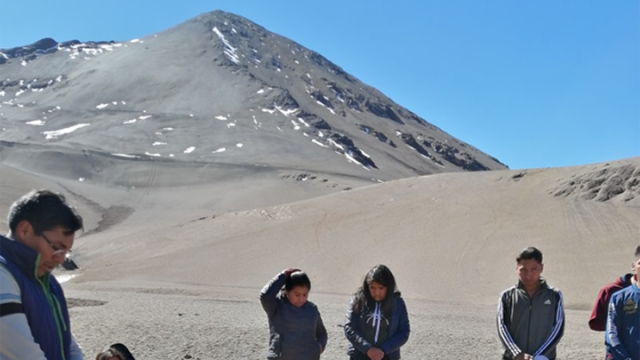
Just yesterday Emma Condori-Mamani, a Bolivian Friend traveling with a concern for climate change in her country, left our small Plainfield Friends Meeting community to move on to the Middlebury Meeting, her third visit within our Quarter. Emma left many ripples in her wake. She brought new and startling details on the climate crisis, shared her vital concern, and somehow still carried a sense of hope as she engaged us in a search for solutions. Emma also travels with a very grounded sense of the Spirit, volunteering full time as director of the Friends International Bilingual Center in La Paz, and emanating her faith. Somehow our U.S. news talks about the Alaskan polar bears and polar ice sheets, but not so much the impact of climate change at high elevation, impacting thousands of Bolivians. Emma made it real to each person who heard her.
So what are some of the details of the climate crisis in Bolivia? Here is a quick summary, followed by the ideas Emma is working on:
- The high mountain glaciers of the Andes have melted, so rivers, lakes, and lagoons have dried up. There are very few fish to eat, very little natural water for people to drink, or for livestock and crops. People are desperate to fulfill their basic needs.
- Even some years ago (1999–2000), there was a "War of Water" in which women went on strike because the government had privatized their water supply and they were expected to buy bottled water from foreign companies for one dollar a bottle. Many women were killed when the military was brought in to break up the strike.
- With no rivers or lakes, the country’s dependence on hydroelectric power is also threatened.
- The temperatures have climbed high even in winter. A cold night is followed by such warmth that people might be wearing summer clothes like shorts at noon. The government has warned that people should not be out in the sun for more than five minutes without wearing a hat and being entirely covered for fear of skin cancer. The highlands are located at 14,000 feet above sea level.
- Storms are frequent. Flooding is worse each year. In the city of La Paz, 400 families were just washed out of their houses by a water-caused landslide, with no salvaging of materials or possessions possible. Most of those families may remain homeless for the rest of their lives as there is no way to regain their small equity.
- A blizzard this July brought snow up to 5 feet high rather than the usual few inches. The snow came up to the chins of the llamas, which froze to death outside. Now those families have lost their source of wool for blankets, and their source of meat and income. Again there is no way to recoup this loss.
And here are some of the ways Emma thinks we and they can help:
- Hold the people of Bolivia in the Light.
- Work with our governments to help turn the climate crisis around. Write our senators.
- Be frugal in our use of water (The youth with whom she works decided on their own to go to the streets and ask Bolivians to drink perhaps only 1 liter of water/day or take fewer showers.)
- Contribute to bio-sand water filters being made by her youth groups in order to help families purify what water they can obtain. (One filter costs $50 and will help two families purify their water for 3 years. Currently the government may bring water into a community in trucks, but the water is green and barely drinkable when it arrives. Some flood waters might also be saved and filtered.)
- Buy her book Quakers in Bolivia which supports the organizing work of the Friends International Bilingual Center in La Paz. (In addition to work on climate change with youth groups, the Friends Center supports translation of Quaker materials into Spanish, English. and Aymara, a variety of classes and workshops on peace and social justice, and national and worldwide Quaker outreach and education. Some American First Day Schools are pairing up with some of those in Bolivia, where more than 20,000 Quakers live.)
- Visit the link to the Bolivian Alpaca Order Form, which in addition to other pieces of information, will guide one through the process of designing and selecting an alpaca scarf, the profits of which go towards making more bio-sand water filters.
And here are some ideas that Emma, never idle, is exploring.
- Would there be a way to get more solar panels in Bolivia in lieu of hydro?
- Would there be a way to use spinning wheels rather than drop spindles?
- Would there be a way to get grants for the translation work?
- Would any of us like to donate a llama, sheep, alpaca, or cow for a Bolivian family?
- Would any of us like to visit Bolivia and learn the issues first-hand, and perhaps do volunteer work?
Plainfield Friends may donate through our treasurer, Sue Jefferys.
Checks can also be sent to Emma Condori-Mamani care of Sita Diehl, 5729 Elder Place, Madison, WI 53705 or through the website for the Friends International Bilingual Center.
Emma Condori-Mamani was sponsored in her travel in the ministry by the NEYM-FWCC Committee.